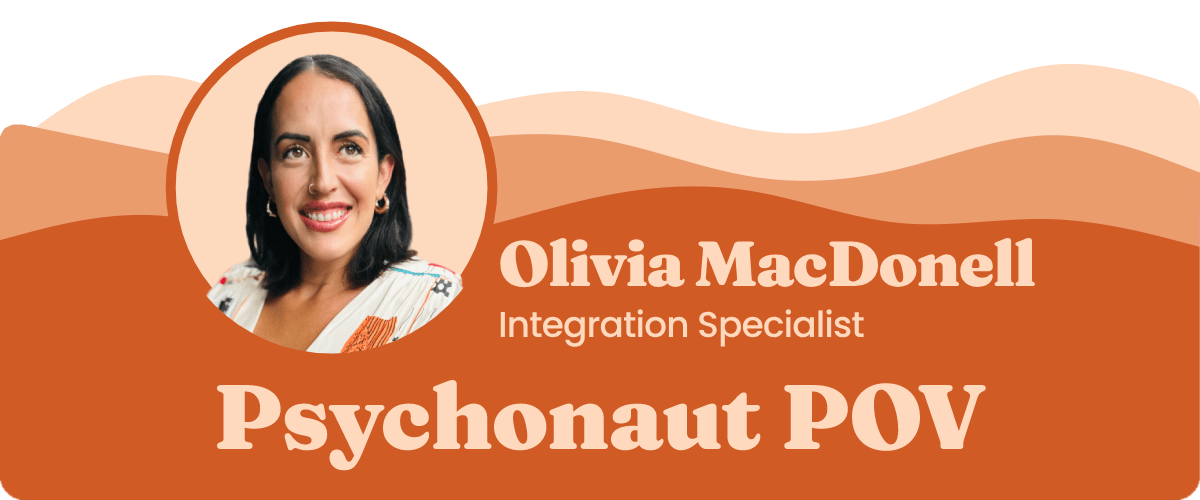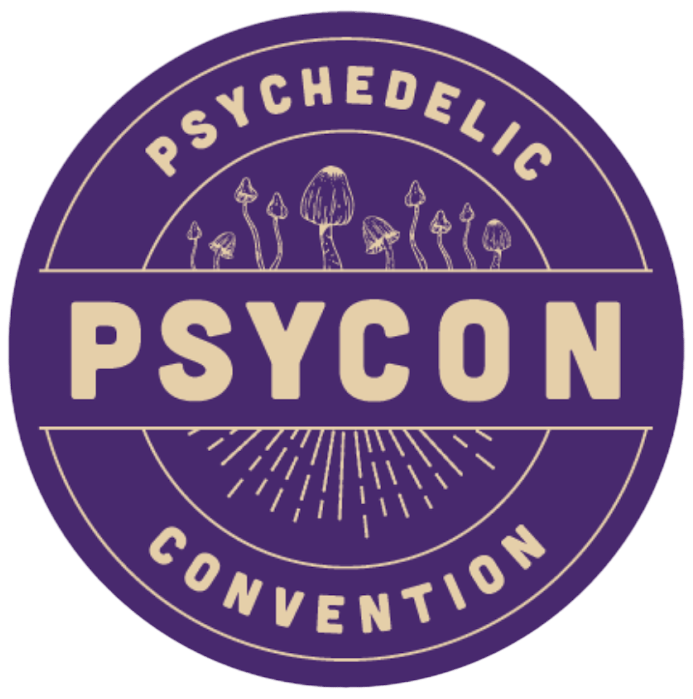Welcome to Tricycle Day. Ok yes, we admit we’re constantly asking you to recruit refer new members readers. But at least we don’t force you cut all ties with your family. Pinky swear this newsletter isn’t a cult. 🤙
⚠️ Last call: When you’re a psychedelic therapist, coach, or guide, all the training in the world will get you nowhere if you don’t have any clients.
Practice Expansion gives you the skills they didn’t teach you—the ones you need to fill your practice and 10x your impact. Plus, an accountability group to make sure it happens.
Doors close today. Apply for Practice Expansion. 👈
When Olivia MacDonell escaped the religious sex cult she was born into, integrating into society felt impossible. That is, until she found MDMA. Her first session sent her down a path of healing that would eventually lead to launching a platform that scales psychedelic therapy with AI.
We spoke to Olivia about her unexpected lessons from surviving a cult, how AI can improve accessibility and outcomes in psychedelic therapy, and where technology will always fall short when it comes to integration.
FROM OUR SPONSORS
Trying to break into the psychedelic industry?
Can’t blame ya. It feels good to make a living pursuing a mission you truly believe in.
Whenever folks ask us how to find career opportunities in this space, we always recommend attending a live event. And Psycon is at the top of the list.
As the leading psychedelic trade show, PsyCon offers entrepreneurs and enthusiasts the chance to learn, network, and shape the future of the psychedelic market.
They have 100+ speakers locked in, and who knows… one of 'em could be your next business partner.

You survived an infamous sex cult. What did that experience teach you about yourself, and how did it eventually lead you to explore psychedelics?
Yes, I was born and raised in the Children of God, a group started in 1969 by David Brandt Berg. It began during the Jesus revolution in California, attracting hippies with a message of love and freedom. Pretty rapidly, the group grew and spread worldwide. It has gone by different names over the years, but the cult still exists in some form today.
One of the big takeaways from my experience is about paradox. I had to learn to hold two opposing truths: I was raised in a missionary organization aiming to heal the world with love, but also in a religious sex cult that ended up hurting a lot of people. Everything is more complicated than good or bad. Eventually, this understanding would help me to make sense of myself and my life.
I left the group at 15, but had a powerful spiritual experience when I visited again with a guy I was dating. A leader played a song called "No Miras Atras" (Don't Look Back), and suddenly my heart opened. I was flooded with unconditional love, and I knew in that moment that I was meant to be of service for the rest of my life. It felt like being hit with the knowledge of my purpose on earth. I rejoined the group, mistakenly thinking that was how I was meant to serve people.
But things weren't great, and I eventually left again. Adapting to the outside world was tough. I didn't know how to get an apartment lease, handle finances, or be a normal adult. Eight years later, my life was full of dysfunction—economic, behavioral, relational, and social. I was desperate to fix my situation, especially given that clear understanding of purpose I'd once had.
That's when I discovered MDMA therapy through podcasts with Rick Doblin. My first MDMA session brought me right back to that place of clarity I'd experienced at 15. Through several sessions, I healed from trauma, recovered forgotten memories, and began to understand the roots of my dysfunction.
Tell us about The Activation Project. What inspired you to start your company, and what's the story behind the name?
The Activation Project was inspired by my experiences both in the cult and with psychedelic therapy. When I rejoined the group at 16, they had launched a self-help magazine called "Activated." It offered valuable content on topics like marriage counseling, stress management, and parenting. For once, it seemed like it wasn’t about the money; the magazine really helped people. I myself made incredible connections through it.
Fast forward to about five years ago. After my MDMA therapy sessions, I realized there was a lack of aftercare and integration support. Without proper follow-up, I faced challenges, especially in communicating my experiences with family. I came on too strong with my sisters, who weren't ready to address their past, and we ended up not speaking for a year.
Another challenge was dealing with "exile parts," or aspects of myself I’d compartmentalized. Psychedelics open up these compartments, which can be overwhelming. I didn't have the tools to integrate these parts back into my sense of self with compassion and acceptance.
Recognizing the need for integration tools, I started creating a resource library to address many of the challenges that come up after psychedelic experiences. It focused on integrating mind, body, and heart by connecting emotions and relationships, addressing the nervous system, and rewiring behaviors and mindsets.
We’ve now built a software platform that gamifies psychedelic integration. It tracks progress and allows therapists and facilitators to upload resources for their clients. We're also integrating AI to customize integration plans. For example, if you've had a psychedelic experience and you're working through perfectionism and people-pleasing, we can structure a plan with practices and exercises tailored to those issues.
Living inside a cult organization that managed to scale for generations must have been insightful, at least. Are there lessons you can take away to help you ethically build your business?
A hundred percent. Growing up, I learned a lot about leadership, seeing different styles play out across various communes. Each one was autonomous but followed Berg's specific structure, which made it possible to scale and flex. Of course, some approaches were more effective than others.
Now, I'm a big advocate of rotating leadership and having a decentralized system where you don't have one person in command for a long period with unchecked power. Having checks and balances is so important, especially when it comes to helping people with mental health and transforming their lives. My time in the cult showed me that leaders need someone to help them see past their ego.
I'm also a believer in tithing—putting a portion of your money to help others or fuel other people making a difference in the world. Obviously, our tithe in the Children of God was going right back to the leaders, but I think it's a beautiful practice when done ethically. Knowing your values and upholding them with integrity matters when it comes to running a business and inspiring a team.
You mentioned you're integrating AI into The Activation Project. How do you see this technology enhancing patients' experiences and outcomes with psychedelic therapy?
The way I see it, there's a pretty standard structure of resources and tools that people need following a psychedelic experience. We've already programmed much of that into our database and resource library. By training AI to pick up on keywords, we can customize integration plans and get people the resources they need quicker than if we just had a human in the loop the entire time.
We're working with a lot of behavior learning. One of my guiding philosophies is, everyone's different. There's no such thing as one-size-fits-all. It's the same with these modalities; certain people are going to work better with certain strategies. So we've created a variety of what we call "activation guides"—essentially, AI chatbots that motivate in different ways. For instance, you've got the more empathetic, nurturing guide, and then you've got the stronger one who’s more indifferent, which can be very effective for rebellious personality types.
Aside from personalizing care, we're also addressing the nationwide shortage of therapists and facilitators. Therapy can be out of reach for many, so we want to have a hybrid model where people can access a one-on-one session with a facilitator or therapist maybe once a month. This way, they can have somebody to check in with, but it's still in an affordable price range.
While AI is promising, it also comes with some risks. What dangers do you see in the intersection of AI and psychedelics that we should be vigilant about?
AI is going to advance so far beyond our control that it’s hard to even imagine. But instead of worrying about what to watch out for, I think we should focus on infusing consciousness and empathy into AI. Instead of being afraid of what could happen, we need to bring intention into what’s being engineered, so that it evolves in the right direction.
I certainly don’t think AI can replace the human touch. That’s why the technology we're building is hybrid by design. Community is such an important part of integration. We're setting ourselves up to have in-person meetups, discussion groups, and breathwork sessions. We want this technology to help people understand themselves better and relate to others better, so that over time they need the technology less. They’re more inspired to be with other people.
Actually, I've been operating my private practice with the same intention for the last five years, even without the AI. I only work with clients for so long. The goal is always to help them become more self-reliant and connected with their community, not be dependent on me.
Want more from Olivia?
Join The Activation Project community to get updates about the platform and technology, or subscribe to experience it firsthand.
UNTIL NEXT TIME
That’s all for today, Cyclists! Whenever you’re ready, here’s how we can help.
📣 Put your brand in front of 58k psychedelic enthusiasts by sponsoring Tricycle Day. Book an ad.
📈 Grow your psychedelic business with our marketing agency. Apply to work with us.
🫂 Get professional support from a vetted therapist, guide, or coach. Browse Maria’s List.
😎 Style yourself out in our iconic merch. Collect a shirt.
✍ Need something else? Reply to this email. (We read every response.)
ONE CYCLIST’S REVIEW

So, how was your tricycle ride?
Forwarded this email? Subscribe here.
DISCLAIMER: This newsletter is for educational and informational purposes only and is not intended as a substitute for professional medical advice. The use, possession, and distribution of psychedelic drugs are illegal in most countries and may result in criminal prosecution.



